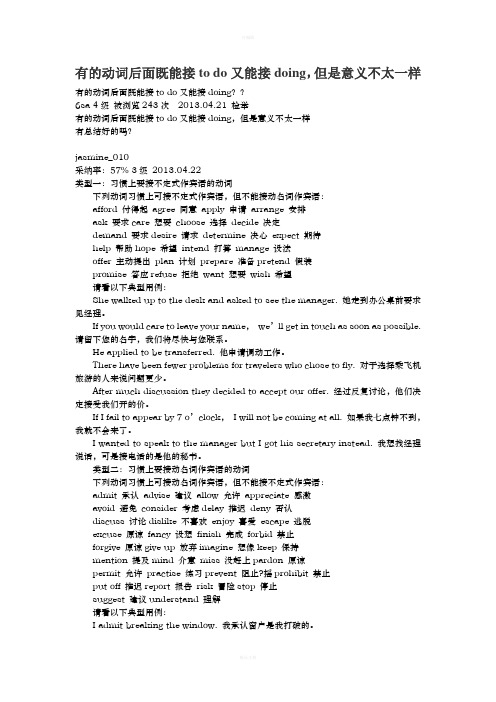todoanddoing用法
todo,doing,do中考高频动词考点汇总

todo,doing,do中考高频动词考点汇总今天就来总结一下初中阶段高频出现的一些动词用法,让你从此告别看到to do, doing, do就一脸懵的囧状。
一、加to do的高频考查动词1. afford to do 负担的起做某事We can’t afford to make any mistakes.我们承担不起任何失误。
2. agree to do同意做某事Do you agree to have dinner today?今天你同意一块吃饭吗?3. choose to do 选择做某事Why do so many choose to leave their country?为什么有这么多人要离开祖国?4. decide to do 决定做某事She decided to accept the offer.她决定接受这一提议。
5. expect to do 期待做某事The shop expects to make more money this year.这家店铺期望今年多赚点钱。
6. hope to do 希望做某事Ihope to see you again sometime next year.我希望明年某一时候再见到你。
7. hurry to do 急忙做某事We shall have to hurry to get there in time.我们将不得不及时赶到那。
8. manage to do 设法做成某事How do you manage to do such a thing?你是怎么设法做这样的事?9. plan to do 打算做某事Where do you plan to spend your holiday?你打算去哪里度假?10. prefer to do 宁愿做某事Iprefer to travel in the front of the car.我宁愿坐在汽车的前面。
todo与to+doing的用法区别

todo与to+doing的用法区别to do与to+doing的用法区别to do与to+doing的用法同学们很容易混淆,下面店铺整理了to do与to+doing的用法区别,希望对大家有帮助!1. 时间不同forget/ remember doing:表示动作发生在“忘记”、“记得”之前forget/ remember to do:表示动作发生在“忘记”、“记得”之后I forgot to do my homework. 我忘记要做家庭作业了。
I forget having finished my homework. 我忘了我已经做完作业了。
2. 功能不同go on/ leave off/ stop doing: -ing分词作宾语go on/ leave off/ stop to do: 不定式作目的状语My father left off working and had some coffee. 我爸爸停下工作,喝了些咖啡。
My father left off to have some coffee. 我爸爸停下来,喝了些咖啡。
3. 含义不同在try, mean, can’t help等动词后接的是ing分词还是to do, 与动词本身含义相关。
try to do sth 努力做某事try doing sth 试着做某事mean to do 打算做某事mean doing sth 意味着做某事can’t help to do sth 不能帮忙做某事can’t help doing sth 情不自禁做某事4. 搭配不同在动词agree, decide后,可直接带不定式,但若带-ing分词,则必须添加介词。
agree to do sth 同意做某事agree on doing sth 同意做某事decide to do sth 决定要做某事decide on doing sth 决定要做某事因此,我们可以看出,虽然以上动词既能跟-ing分词,也能带不定式,但意义却不相同。
有的动词后面既能接todo又能接doing

有的动词后面既能接to do又能接doing,但是意义不太一样有的动词后面既能接to do又能接doing??6sa 4级被浏览243次2013.04.21 检举有的动词后面既能接to do又能接doing,但是意义不太一样有总结好的吗?jasmine_010采纳率:57% 3级2013.04.22类型一:习惯上要接不定式作宾语的动词下列动词习惯上可接不定式作宾语,但不能接动名词作宾语:afford 付得起agree 同意apply 申请arrange 安排ask 要求care 想要choose 选择decide 决定demand 要求desire 请求determine 决心expect 期待help 帮助hope 希望intend 打算manage 设法offer 主动提出plan 计划prepare 准备pretend 假装promise 答应refuse 拒绝want 想要wish 希望请看以下典型用例:She walked up to the desk and asked to see the manager. 她走到办公桌前要求见经理。
If you would care to leave your name,we’ll get in touch as soon as possible. 请留下您的名字,我们将尽快与您联系。
He applied to be transferred. 他申请调动工作。
There have been fewer problems for travelers who chose to fly. 对于选择乘飞机旅游的人来说问题更少。
After much discussion they decided to accept our offer. 经过反复讨论,他们决定接受我们开的价。
If I fail to appear by 7 o’clock,I will not be coming at all. 如果我七点钟不到,我就不会来了。
高中常考todo doing短语

高中常考todo doing短语在高中英语学习中,常会遇到一些todo doing短语,它们在阅读理解和写作中都经常出现。
这些短语可以帮助我们更好地理解和表达文章内容,在考试中也起到了关键作用。
接下来我们将介绍一些常见的todo doing短语及其用法。
常见的todo doing短语1.Look forward to–用法:表示期待或盼望某事发生。
–例句:I look forward to seeing you soon.2.Think of–用法:考虑到,考虑。
–例句:What do you think of this idea?3.Be used to–用法:表示习惯于某种情况。
–例句:I’m used to getting up early.4.Be good at–用法:擅长于某事。
–例句:She’s good at playing the piano.5.Be interested in–用法:对……感兴趣。
–例句:I’m interested in learning new languages.6.Be capable of–用法:能够做某事。
–例句:He is capable of solving complex math problems.7.Give up–用法:放弃。
–例句:Don’t give up, keep trying.8.Be sorry for–用法:对……感到抱歉。
–例句:I’m sorry for being late.如何正确使用todo doing短语1.理解上下文:在阅读理解中,根据上下文理解todo doing短语的含义,以帮助理解文章。
2.背诵常见短语:背诵常见的todo doing短语并在写作中灵活运用,能提高文章表达的准确性和流畅性。
3.练习运用:在平时学习中,多加练习将todo doing短语运用到句子中,提高熟练度。
总结todo doing短语在高中英语学习中起到了重要作用,熟练掌握这些短语对于提高阅读理解和写作能力至关重要。
英语中不定式(todo)的6种成分和2种独立用法

英语中不定式(todo)的6种成分和2种独立用法非谓语是英语学习的重点也是难点,很多同学对这个语法知识一直是处于比较懵的状态。
其实只要掌握非谓语所充当成分的用法就可以运用自如了。
非谓语,顾名思义就是不做谓语的动词的变化形式,即to do ,doing,done。
除了谓语,句子成分中还有主语、宾语、表语、宾语补足语、定语和状语。
下面看看不定式(to do)充当这6种成分的用法:一、不定式作主语1.To see is to believe. (这种情况不常用)2. It is important to learn English well.It 是形式主语,真正的主语是 to learn English well. 这种用法是常用的而且是考点!考点!考点!二、不定式作表语:常说明主语的内容、性质和特征或表动作将要发生。
1. My job is to keep the children safe.2.My task is to type the article.三、不定式做宾语1.He prefers to eat white bread and rice.2.He wants to play football.3.动词feel, find, make, think等后面,可以用it作形式宾语代替真正的宾语——动词不定式,句子结构是...feel / find / make / ... it+adj. / n.+to do...。
如:I find it difficult to remember everything.常接动词不定式作宾语的动词有:(需要记住)agree, afford, appear, ask, attempt;care, choose, claim;dare,decide,demand,deserve,determine;expect, fail, get, guarantee;hate, hesitate, hope, hurry;intend, learn, manage, offer,plan, prepare, pretend, promise;refuse, seem, tend, threaten;want, wish 等四、不定式做宾语补足语1.I'd invite her to have dinner at my house.2 . We should allow the children to choose their own clothes.Note 1: 带to的动词不定式作宾语补足语的动词主要有:要求允许提议(ask, allow, advise),期望邀请鼓励(expect, invite, encourage),教导告诉想要(teach, tell, want),等待希望愿意(wait for, wish, would like / love)。
动词后面加todo和doing的规则

动词后面加todo和doing的规则一、动词后面加todo的规则1. 不及物动词不及物动词是指不需要接受动作的动词,如:跳跃、奔跑、呼吸等。
当不及物动词后面加上todo时,表示计划或打算去做某事。
例如:- I want to do a lot of things, such as traveling around the world and learning a new language.- She loves dancing, so she wants to do ballet as her hobby.2. 及物动词及物动词是指需要接受动作的动词,如:吃、喝、看等。
当及物动词后面加上todo时,表示计划或打算去做某事,而不是实际进行这个动作。
例如:- I need to do my homework before going out to play with friends.- He wants to do some research on this topic to deepen his understanding.3. 动词短语有些动词是由动词和介词、副词或形容词构成的动词短语,如:look forward to、take care of、give up等。
当这些动词短语后面加上todo时,表示计划或打算去做某事。
例如:- She is looking forward to doing some shopping during the holiday.- They should take care of their health by doing exercise regularly.二、动词后面加doing的规则1. 不及物动词不及物动词后面加上doing表示正在进行某个动作。
例如:- She is swimming in the pool now.- They are playing basketball in the park.2. 及物动词及物动词后面加上doing表示正在进行某个动作,并且这个动作有对象。
独立主格中to do,doing,done的区别
独立主格中to do,doing,done的区别1.不定式todo表示动作没有发生或即将发生,且todo动作的执行者是句子的主语。
动词不定式和它前面的名词或代词如果存在着逻辑上的主谓关系,动词不定式则用主动的形式;如果是动宾关系,则用被动形式。
Themanagerlooksworried,manythingstosettle.经理看上去很着急,有这么多的事情要处理。
Thefourofusagreedonadivisionoflabor,eachtotranslateaquarterofthebook.我们四人同意分工干,每人翻译全书的四分之一。
Manytrees,flowers,andgrasstobeplanted,ournewly-builtschoolwilllookevenmorebeautiful.种上许多的树、花和草后,我们新建的学校看上去将更美。
2.动词-ed形式表示动作已经结束,与-ed的主语构成被动关系。
Hewaslisteningattentivelyinclass,hiseyesfixedontheblackboard.他上课专心听讲,眼睛紧盯着黑板。
Theworkersworkedstillharder,theirlivingconditionsgreatlyimproved.由于工人们的生活条件大大提高,他们工作得更起劲了。
Thepresidentassassinated,thewholecountrywasindeepsorrow.总统被谋杀了,举国上下沉浸在悲哀之中。
3.动词-ing式往往表示动作正在进行,-ing的主语和动作构成主动关系. Thefoodbeingcooked,theboywaswatchingTV.小孩一边做饭,一边看电视。
Thegirlstaringathim,hedidn'tknowwhattosay.姑娘两眼望着他,他不知道说什么好。
efforttodo和doing的用法
efforttodo和doing的用法"Effort to do" 和 "doing" 都是表示努力做事的用法,下面就对这两个表达进行详细解释。
1. Effort to do: "Effort to do" 是指为了完成一些任务或达到一些目标而付出的努力。
以下是一些示例句子:(她为了按时完成项目付出了巨大的努力。
)- The students put a lot of effort into preparing for the exams.(学生们在准备考试方面付出了很多努力。
)(该公司正在努力减少其碳排放量。
)- It takes a lot of effort to be successful in any field.(在任何领域都需要付出很多努力才能成功。
)2. Doing: "Doing" 通常用来表示正在进行的动作或活动。
以下是一些示例句子:- I saw him doing his homework in the library.(我看见他正在图书馆做作业。
)- She enjoys doing yoga in the morning.(她喜欢早上做瑜伽。
)- They were caught by the police while they were doing graffiti on the wall.(他们在墙上涂鸦时被警察抓住了。
)(我听到从厨房传来奇怪的声音,所以我去看看发生了什么事。
结果发现是我的猫在柜台上做空翻。
)"Effort to do" 强调了为完成事所付出的努力,而 "doing" 则强调具体正在进行的动作。
两者可以结合使用来描述一个人在付出努力来完成件事情的过程。
例如:- He is putting a lot of effort into running the marathon. He has been training every day and is currently doing a 10-mile run.(他正在为马拉松比赛付出很多努力。
to-do和doing用法及区别
1.finish, enjoy, feel like, consider,imagine, keep, delay(拖延,推迟), mind, practise, suggest, risk, quit +doing2. to do 和doing的区别:1)forget to do 忘记要去做某事(此事未做)forget doing忘记做过某事(此事已做过或已发生)2)stop to do 停止、中断(某件事),目的是去做另一件事stop doing 停止正在或经常做的事3)remember to do 记住去做某事(未做)remember doing记得做过某事(已做)4) regret to do对要做的事遗憾regret doing对做过的事遗憾、后悔5)try to do努力、企图做某事try doing试验、试一试某种办法6) mean to do打算,有意要…mean doing意味着7)go on to do 继而(去做另外一件事情)go on doing 继续(原先没有做完的事情)8)propose to do 打算(要做某事)propose doing建议(做某事)9) like /love/hate/ prefer +to do 表示具体行为;+doing sth 表示抽象、倾向概念(注)如果这些动词前有should一词,其后宾语只跟不定式,不能跟动名词。
例如:I should like to see him tomorrow.10) need, want, deserve +动名词表被动意义;+不定式被动态表示“要(修、清理等)”意思。
Don’t you remember seeing the man before?你不记得以前见过那个人吗?You must remember to leave tomorrow.你可要记着是明天动身。
I don’t regret telling her what I thought.我不后悔给她讲过我的想法。
初中三年全部英语动词+doing和+to do 规则
在初中三年英语学习中,动词后接doing 和to do 的规则是一个重要知识点。
以下是一些常见的规则:一、接不定式(而不接动名词)作宾语的24 个常用动词:afford to do sth. 负担得起做某事;agree to do sth. 同意做某事;arrange to do sth.安排做某事;ask to do sth. 要求做某事;beg to do sth. 请求做某事;care to do sth. 想要做某事;choose to do sth. 决定做某事;decide to do sth. 决定做某事;demand to do sth. 要求做某事;determine to do sth. 决心做某事;expect to do sth. 期待做某事;fear to do sth. 害怕做某事等。
二、接动名词(而不接不定式)作宾语的34 个常用动词:consider doing sth. 考虑做某事;enjoy doing sth. 喜欢做某事;escape doing sth. 逃脱做某事;finish doing sth. 完成做某事;imagine doing sth. 想象做某事等。
三、接不定式作宾补的36 个常用动词:advise sb. to do sth. 建议某人做某事;allow sb. to do sth. 允许某人做某事;ask sb. to do sth.请(叫)某人做某事等。
四、可接doing 或不定式作宾语,但含义不同的动词:forget to do sth. 忘记要做某事(未做);forget doing sth. 忘记做过某事(已做);remember to do something 记得要做某事(未做);remember doing something 记得做过某事(已做)等。
- 1、下载文档前请自行甄别文档内容的完整性,平台不提供额外的编辑、内容补充、找答案等附加服务。
- 2、"仅部分预览"的文档,不可在线预览部分如存在完整性等问题,可反馈申请退款(可完整预览的文档不适用该条件!)。
- 3、如文档侵犯您的权益,请联系客服反馈,我们会尽快为您处理(人工客服工作时间:9:00-18:30)。
加to do 的动词attempt企图enable能够neglect忽视afford负担得起demand要求long渴望arrange安排destine注定mean意欲,打算begin开始expect期望omit忽略,漏appear似乎,显得determine决定manage设法cease停止hate憎恨,厌恶pretend假装ask问dread害怕need需要agree同意desire愿望love爱swear宣誓volunteer志愿wish希望bear承受endeavor努力offer提供beg请求fail不能plan计划bother扰乱;烦恼forget忘记prefer喜欢,宁愿care关心,喜欢happen碰巧prepare准备decide决定learn学习regret抱歉,遗憾choose选择hesitate犹豫profess表明claim要求hope希望promise承诺,允许start开始undertake承接want想要consent同意,赞同intend想要refuse拒绝decide决定learn学习vow起contrive设法,图谋incline有…倾向propose提议seek 找,寻觅try试图2)下面的动词要求不定式做宾补:动词+宾语+动词不定式ask要求,邀请get请,得到prompt促使allow允许forbid禁止prefer喜欢,宁愿announce宣布force强迫press迫使bride 收买inspire鼓舞request请求assist协助hate憎恶pronounce断定,表示advise 劝告exhort告诫,勉励pray请求authorize授权,委托help帮助recommend劝告,推荐bear容忍implore恳求remind提醒beg请求induce引诱report报告compel强迫invite吸引,邀请,summon传唤command命令intend想要,企图show 显示drive 驱赶mean意欲,打算train训练cause引起instruct指示require要求deserve应受leave使,让tell告诉direct指导like喜欢tempt劝诱entitle有资格order命令warn告诫enable使能够need需要urge激励,力说encourage鼓励oblige不得不want想要condemn指责,谴责lead引起,使得teach教entreat恳求permit允许wish希望(2)有少数动词只能用动名词作宾语acknowledge承认,自认cease 停止mention 说到,讲到admit 承认tolerate忍受dislike不喜欢,讨厌advocate:提倡,主张complete完成dread 可怕appreciate 感激,欣赏confess坦白endure忍受avoid避免contemplate细想enjoy享有,喜爱bear忍受defer拖延envy嫉妒can’t help不禁delay延迟escape逃跑,逃避can’t stand 受不了deny否认excuse借口consider 考虑detest嫌恶fancy幻想,爱好favor 造成,偏爱mind 介意repent悔悟figure描绘,计算miss错过resent怨恨finish完成,结束不得pardon原谅,饶恕resist 抵抗,阻止forgive原谅permit 允许resume恢复imagine设想postpone延迟,延期risk冒险involve卷入,包含practise 实行,实践suggest建议hate讨厌prevent阻止save营救,储蓄keep保持quit放弃停止stand坚持,忍受loathe非常讨厌,厌恶recall回想例如:I appreciate having been given the opportunity to study abr oad two years ago.我很感激两年前给我出国学习的机会。
(3)有些动词后使用动名词和动词不定式作宾语的差别1)forget to do 忘记要去做某事(此事未做)forget doing忘记做过某事(此事已做过或已发生)2)stop to do 停止、中断(某件事),目的是去做另一件事stop doing 停止正在或经常做的事3)remember to do 记住去做某事(未做)remmber doing记得做过某事(已做)4) regret to do对要做的事遗憾regret doing对做过的事遗憾、后悔5)try to do努力、企图做某事try doing试验、试一试某种办法6) mean to do打算,有意要…mean doing意味着7)go on to do 继而(去做另外一件事情)go on doing 继续(原先没有做完的事情)8)propose to do 打算(要做某事)proposing doing建议(做某事)9) like /love/hate/ prefer +to do 表示具体行为;+doing sth 表示抽象、倾向概念(注)如果这些动词前有should一词,其后宾语只跟不定式,不能跟动名词。
例如:I should like to see him tomorrow.10) need, want, deserve +动名词表被动意义;+不定式被动态表示“要(修、清理等)”意思。
Don’t you remember seeing the man before你不记得以前见过那个人吗You must remember to leave to morrow.你可要记着是明天动身。
I don’t regret telling her what I thought.我不后悔给她讲过我的想法。
(已讲过)I regret to have to do this, but I have no choice.我很遗憾必须这样去做,我实在没办法。
(未做但要做)补充动词加doing1. feel like+V-ing2. enjoy/like+V-ing3. stop doing sth.4. stop/prevent/keep from+V-ing5. finish+V-ing6. It’s another way of+V-ing7. spend...( in )+V-ing8. hear/see sb.+V-ing9. be good at+V-ing10. be busy+V-ing11. be worth doing sth.12. go / keep on+V-ing13. What/How about doing sth.14. Thanks for doing sth15. Preferdoing sth.. to doing sth. 16. forget doing sth.17. remember doing sth.18. instead of doing sth.19. hate/dislike doing sth.20. be used for doing sth.21. be/become interested in do ing sth.22. Would you mind doing sth.23. have fun doing sth.24. practise doing sth25. better than doing ssth.26. do well in+V-ing27. 介词后面的动词要用V-ing形式,如:another way of doing sth.28.动名词做主语用V-ing形式,如:Reading in bed is bad for yo ur eyes.TO的不定式短语和TO DOING短语下列动词或词组后面都可以接doing:admit 承认appreciate 感激avoid 避免complete完成consider认为delay 耽误deny 否认detest 讨厌endure 忍受enjoy 喜欢escape 逃脱fancy 想象finish 完成imagine 想象mind 介意miss 想念postpone推迟practice 训练recall 回忆resent 讨厌resume 继续resist 抵抗risk 冒险suggest 建议face 面对include 包括stand 忍受understand 理解forgive 宽恕keep 继续例如:Would you mind turning down y our radio a little, please 你把收音机音量调小一点,好吗The squirrel was lucky that i t just missed being caught. 这松鼠幸运得很,刚逃避了被逮住的厄运。
admit to prefer...tobe used to lead to devote oneself to object tostick to no goodno use be fond oflook forward to be proud ofbe busy can't help be tired of be capableofbe afraid of think ofburst out keep on insist on count onset about put offbe good at take up give up be successfu l in下列动词或词组都可以用不定式:afford aimagree arrangeask decidebother carechoose demanddesire determineelect endeavorhope failhelp learnlong 渴望 meanmanage offerplan pretendrefuse tendundertake expecthate intend例如:The driver failed to see the other car in time. 司机没能及时看见另一辆车。
He offered to help me. 他表示愿意帮助我。
需要省略to的不定式的情况有:1)情态动词(除ought 外)后。
2)使役动词let, have, make后,感官动词see, watch, look at, notic e , observe, hear, listen to, smell, feel, find 等后。
